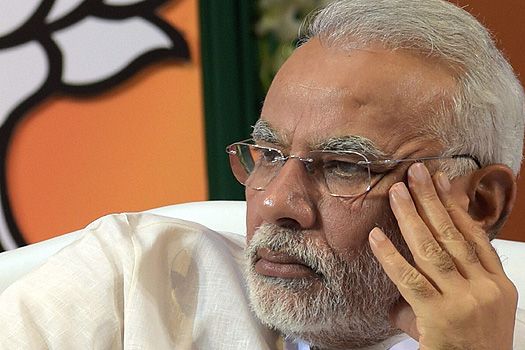 | « Back to article | Print this article |
 A few days ago, Finance minister Arun Jaitley declared that the opposite of tax terror cannot be a haven.
A few days ago, Finance minister Arun Jaitley declared that the opposite of tax terror cannot be a haven.
Digging in his heels against the critics of his government, he asserted that Modi sarkar would not let go of what it sees as "legitimate tax demands".
Mr Jaitley was referring to tax notices slapped on foreign institutional investors (FIIs) to extract Rs 40,000 crore (Rs 400 billion) from them under a tortuous law called minimum alternate tax (MAT).
He is obviously unconcerned about how this sounds when India's tax department is already infamous for arbitrariness.
MAT brings out this infuriating arbitrariness rather well. MAT was created in 1987 to snag companies (mainly Reliance Industries) that had no tax liability, thanks to a plethora of exemptions, but still paid dividends.
Instead of reducing the exemptions, every single government has continued with the exemptions and also this iniquitous law.
Practising chartered accountants tell me that MAT calculations are extremely tedious to the delight of tax officers.
Indeed the story of MAT over the years illustrates how maddening, hypocritical and unfair Indian politicians and tax babus can be.
For starters, every government has left it unclear whether MAT applies to only Indian companies or even foreign ones.
Remember, FIIs started investing in India in 1993.
If MAT is applicable now, it was applicable then.
But the tax department did not bother earlier. In 1999, the National Democratic Alliance came to power. The current finance minister, Mr Jaitley, was then the law minister.
If MAT is applicable to FIIs today, it was applicable then, too. Nobody bothered. P Chidambaram and to some extent Pranab Mukerjee are widely seen to have led one of the nastiest tax regimes between 2004 and 2014. Even they did not think it fit to catch FIIs under MAT.
The reason: MAT is generally applicable to companies having a "place of business in India"; they can draw up a balance sheet and a profit-and-loss account for their business income, so that "book profits" under MAT can be calculated. FIIs and other many other foreign firms have no place of business in India, working out of Mauritius, Singapore and other places.
So in 2010, the Authority for Advanced Rulings (AAR) ruled in a case involving Timken that MAT did not apply to foreign companies that didn't have a place of business in India.
Meanwhile, three official sources - notes on clauses explaining the provisions of the Finance Bill 2002, a circular issued by the Central Board Of Direct Taxation and a statement in the speech of finance minister Mr Chidambaram - all supported the notion that MAT was not applicable to foreign companies.
However, all this suddenly became irrelevant in 2012, when the same AAR, presided by another judge, ruled in the GlaxoSmithKline case that MAT was applicable to all companies.
This means successive governments have hoodwinked foreign investors, including FIIs, into believing that MAT does not apply to them.
They were wrong to do so; but no, nobody will pay a price for this.
Then, using this ruling, in late 2014, the Modi government started sending demand notices to FIIs for paying MAT on capital gains.
Remember, this was the first time ever any government has done so, and the Modi government has promised no tax terrorism.
When FIIs rushed to the finance ministry, Mr Jaitley used his discretion and added long-term capital gains of FIIs to the list of items exempt from MAT in Budget 2015.
That is how we practice the rule of law in India - through discretions. But he wants to extract money from FIIs for the demand already made.
By the way, there are two major problems with the tax demands made by Mr Jaitley.
First, they perversely override the laid-down benefits enjoyed by foreign entities under the country's bilateral tax treaties. Second, most FIIs say that they have already distributed profits of prior years and so may not have the money to pay the tax.
Their problems be damned.
It is now clear that this government, for the first time ever, wants to extend the dubious and unfair MAT to all income from foreign companies, except FIIs for only capital gains from stocks.
This means foreign companies will be taxed for all income, including royalties and interest. Many of them will start getting demand notices like FIIs have.
I am not sure the government has understood the backlash it will have to deal with. For instance, for FIIs, only capital gains from stocks is exempt, not interest income.
So what happens to the income of FIIs who have invested Rs 3 lakh crore in the debt market? Their income may be subject to MAT, both of the past and of the future.
If and when tax demand notices are issued to them, they may panic. This will scare off long-term debt investors in infrastructure projects that Narendra Modi wants to attract.
And in the short-term, it may attract FII selling in the debt market, leading to a weakening of the rupee and higher interest rates.
At one stroke, the dream of lower interest rates will be punctured. Has the Modi government considered all the implications of applying MAT on all foreign companies?
Making laws with loopholes and leaving open the interpretations is the worst form of governance.
MAT is a bad law. It needs to be scrapped especially since Mr Jaitley has promised to reduce exemptions and reduce the tax rate over the next four years.
As of now, however, Mr Jaitley and Mr Modi seem happy to make use of the petty, adversarial and labyrinthine Indian tax system, well-exemplified by MAT, that they have inherited, to collect more taxes.
Photograph: PTI
Debashis Basu is the editor of www.moneylife.in